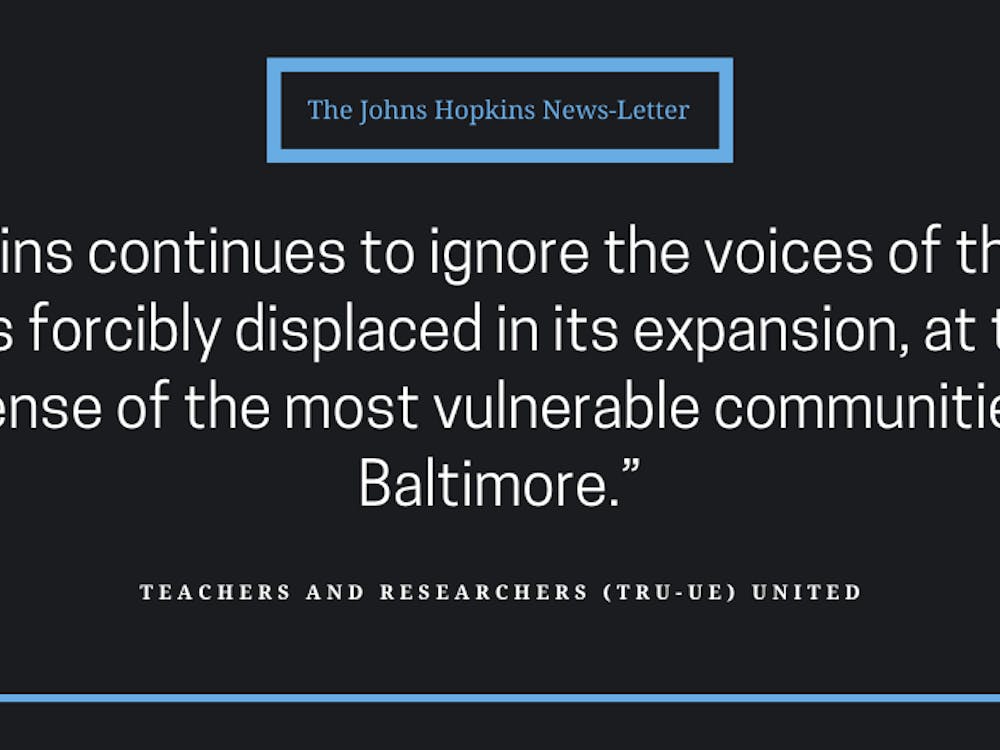The Campus Kitchen chapter at Hopkins seeks to alleviate local hunger through its partnership with Bon Appétit Management Company, donating leftover food from campus dining facilities to Baltimoreans in need.
The club, an offshoot of a national organization dedicated to sustainable campus food, helps bring Hopkins leftovers to the hungry in the local community.
Elizabeth Chen, food resources director of the Hopkins chapter, outlined the organization’s goals.
“Our mission is aimed to build a more sustainable approach to food on the University’s campus and beyond,” Chen said. “Our goal is to reduce food insecurity in the near community through food recovery — feeding the needy while reducing food waste.”
Chen quoted statistics on hunger from Baltimore City and Feeding America and described why the work of Campus Kitchen is so significant for the local community.
“This program is important simply because of the amount of food wasted or composted and the number of hungry people in the community,” she said. “As of 2012, one in four of Baltimore’s African-American residents lived in a food desert, and 22.6 percent of the Baltimore City population was food insecure.”
Campus Kitchen’s newest program helps transport leftover, pre-packaged Meals in a Minute to the needy of Baltimore with the cooperation of Bon Appétit. Chen described the food recovery process in detail.
“They have agreed to start donating leftover food that would otherwise be thrown away for us to bring to various soup kitchens, food banks and homeless shelters,” Chen said. “Currently, we are recovering the Meals in a Minute meals on Fridays when Levering closes and they throw away perfectly good food because of the approaching weekend. Additionally, the Meals in a Minute [are best to donate] because they are individually packaged and easy to transport.”
The Franciscan Center of Baltimore is a beneficiary of Campus Kitchen’s efforts. According to Chen, Campus Kitchen’s donations help the center allocate its money to other pressing needs and lowers the percentage of their budget that they have to spend on food.
“[The Franciscan Center purchases] most of their foods from their own budget to give to the homeless and hungry,” Chen said. “With our help, they could save money on food and instead put the money towards other uses.”
The group had faced challenges following the departure of Aramark, the former Hopkins food service provider, and its replacement with Bon Appétit Management Company. Annie Cho, the group’s programming director, said that ensuring donations from under Bon Appétit was initially difficult due to continuous changes in management.
“Our group had a successful food recovery program in place with Hopkins’s previous catering company, Aramark, but once the reins were transferred to Bon Appétit, it was hard to get in touch and fluidly continue the food recovery aspect of Campus Kitchen,” Cho said. “In the interim, we continued to have prep shifts at the Franciscan Center and, last year, cooking shifts at the Church of the Guardian Angel. We are happy to establish this partnership because all of the food that would otherwise go to waste and be disposed of will now be turned over to local non-profit organizations to benefit the local Baltimore community.”
Cho described how the group negotiated with Bon Appétit.
“All the board members worked as a group to get this in place,” Cho said. “We had a meeting with Ty Paup, the general manager of Bon Appétit on campus, laid out our organization’s policies on food recovery and transportation and established a schedule to get the ball rolling on this program.”
Additionally, Cho said that Campus Kitchen tries to help Bon Appétit reduce waste.
“On Bon Appétit’s end, because we record how much food is recovered from them, they can use this information for cost and waste reduction, so it’s a win-win situation,” Cho said.
Chen said that getting dining facilities and restaurants to agree to donate their leftovers can be difficult because restaurants are afraid of liability in case someone gets sick from donated food.
“It is generally difficult to get restaurants, grocery stores, food facilities, etc. to give donations because they are afraid of liability,” Chen said. “Most of them are unaware of the Bill Emerson Good Samaritan Act that protects organizations who give donations in good faith from any sort of liability. This means that if a recipient becomes sick from the donated food, the donor does not have any sort of liability. Part of our group’s job is also to inform community members of this act.”
The group plans to expand its operation even further after its membership grows large enough to support greater giving. “Once we have a steady flow of donation and food-safe certified volunteers, we can begin to bring the hot perishable foods from the FFC and Nolan’s on a daily or bi-weekly basis,” Chen said. “I’m hoping that will start in the fall of 2015.”
Cho also said she hopes that the group will soon be able to expand their giving.
“Once the program expands from just recovering Meals in a Minute to recovering prepared food as well, then we hope to reach out to other sites,” Cho said.






















Please note All comments are eligible for publication in The News-Letter.